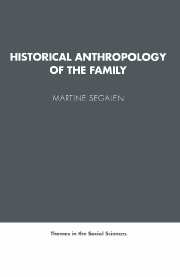Book contents
- Frontmatter
- Contents
- Foreword
- INTRODUCTION
- Part One The area of kinship
- Part Two The making of the domestic group
- Part Three Domestic roles and activities
- 7 ROLES WITHIN THE COUPLE IN THE NINETEENTH CENTURY
- 8 ROLES WITHIN THE PRESENT-DAY COUPLE
- 9 THE DOMESTIC GROUP AND ECONOMIC ROLES
- 10 FAMILY AND SOCIETY
- Notes
- Index
10 - FAMILY AND SOCIETY
Published online by Cambridge University Press: 14 January 2010
- Frontmatter
- Contents
- Foreword
- INTRODUCTION
- Part One The area of kinship
- Part Two The making of the domestic group
- Part Three Domestic roles and activities
- 7 ROLES WITHIN THE COUPLE IN THE NINETEENTH CENTURY
- 8 ROLES WITHIN THE PRESENT-DAY COUPLE
- 9 THE DOMESTIC GROUP AND ECONOMIC ROLES
- 10 FAMILY AND SOCIETY
- Notes
- Index
Summary
Some time ago, a small but rather disturbing item of news was reported in the French press. Tourists and art-lovers could not visit certain galleries in the Louvre on Saturdays and Sundays. Why? Because there had been a strike, and as a result the attendants, who are mostly women, had gained the right to spend every other weekend at home with their families. As there had been no increase in staff, half the galleries were closed because there was no-one to look after them. This is an example of the constant interplay between family and society, complicated in this case by the twofold role and recommendations of the state. As an employer, the state has to work within the constraints of its budget. As custodian of the nation's future, it purports to urge mothers to look after their children on weekends.
The complex relationships between the family (and it is quite in order to use the general term here) and society are more than simply those between the family and the state. In this work, we have frequently raised the question of the interlinked effects of family and social change, of whether the family is modified by the influence of migration, urbanisation and industrialisation. We first established that changes are not unilinear and do not take place in the same way or at the same rate in different social classes. It is only possible to speak of industrialisation in very general terms given the very varied ways in which work is organised and the wide range of technical contexts, the importance of which has emerged from our study of family structures and relationships.
- Type
- Chapter
- Information
- Historical Anthropology of the Family , pp. 286 - 308Publisher: Cambridge University PressPrint publication year: 1986

